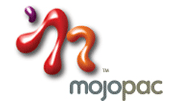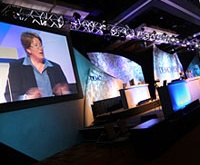A new chapter in the continuing question of email privacy — if there is such a thing — opens today, as the aptly named Void Communications announces its new VaporSteam service at the DEMOfall conference in San Diego. [The event kicks off tonight in San Diego and I’m headed there soon. See my previous posts about it.]  The company says its technology is the “world’s first recordless electronic communications system.” The announcement from Void, based in NYC, says “VaporStream electronic messages never create or leave a record” and that it is “providing employees with an alternative electronic communications system.”
The company says its technology is the “world’s first recordless electronic communications system.” The announcement from Void, based in NYC, says “VaporStream electronic messages never create or leave a record” and that it is “providing employees with an alternative electronic communications system.”
How does it work? Using your existing e-mail address, Void says its technology automatically separates the sender’s and receiver’s names and the date from the body of the message, never allowing them to be seen together: “VaporStream messages cannot be printed, cut and pasted, forwarded or saved, helping promote open and collaborative communications. Once read, VaporStream stream messages are gone forever.” The instant a VaporStream stream message is sent, the company says, it is placed in a temporary storage buffer space. “When the recipient logs in to read their message, the message is removed from the buffer space. By the time the recipient opens it, the complete stream message no longer exists on the server or any other computer.”
Anyone can go to the company’s web site and sign up for the service at $39.95 per year. It is Web-based, meaning that no hardware or software purchases are required. The company also says that VaporStream is completely immune to spam and viruses.
But this technology raises all kinds of questions. The most glaring of which being: How will the bad guys (take your pick: money launderers, terrorists, corporate wrong-doers, et al) be prevented from using this technology? The answer, I guess, is they will not. And what will — or can — the regulatory bodies that dictate archiving of business email, such as the SEC, do about it? How would companies control the risks associated with their employees using this form of electronic communications? Would they simply leave the decision up to the individual? That does not seem likely. Companies own their own corporate messaging systems, and therefore have every right to monitor, control, archive, save, search, and retrieve from it whatever and however they want.
Void Communications seems to be bucking a big trend toward the archiving of email by signaling they will actually try to sell their concept to business. To wit: “Companies seeking a reprieve from the risks and costs inherent in their e-mail system can benefit from using VaporStream stream messaging. As the first secure, recordless complement to e-mail on the market, VaporStream is an attractive method for communicating confidentially in the corporate environment.”
Trouble is, it goes in the face of existing laws that are pressuring companies to archive everything. The laws are so stringent that many companies even disallow the use of IM in the workplace, especially those in highly regulated industries such as financial services — simply because it’s too hard for them to control, retain (archive), and search, because it’s outside the corporate email system. Now this to contend with? How many companies might flat-out ban this as well?
Allowing individual employees to determine what will or will not be a business record goes against what a large percentage of companies (I think it’s fair to say the majority of well-informed companies) are doing these days with electronic messaging: archiving everything. This is as opposed to say, only saving all corporate emails for 30 days and flushing the system. Why? Because managing your own records, knowing what you have and being able to quickly search it, is better that having someone external to your company produce that “smoking gun” email from some other computer or server somewhere that implicates your company or one of its officers or employees in wrongdoing, somewhere down the line. Remember, once an email is sent, there’s no controlling where it ends up and gets saved, forwarded, backed up, or archived. Thus the point: archive everything and be able to search it quickly, or you’re living dangerously. The email archiving market is one of the hottest growth segments in IT today, in the range of 35% CAGR. Storage is cheap, and archiving systems are becoming much simpler and easier to implement.
But Void seems to be taking the approach that will allow individual employees to determine whether or not an email should be preserved or maintained in the first place. Here’s what they say: “With VaporStream, electronic communications policies can be as simple as: If you need a record, e-mail it. If you don’t, use VaporStream.”
Would that it were that simple.
Here’s more on the company’s FAQ page. Two of the benefits the company cites elsewhere on its web site are these: “Guaranteed Confidentiality: VaporStream is the first recordless electronic communications system that protects companies from the risks and costs associated with e-mail. Simply put, it keeps confidential information confidential.” And “Saves Companies Money: From e-mail discovery services to e-mail analysis services to e-mail storage. Since no record is produced using VaporStream, corporate networks are saved from congestion and other potential hazards. It also limits the risk and liability inherent in e-mail communications.”
That last sentence is interesting. Yes, if an employee is thinking about doing something less than above board, he or she will simply think, “Oh, why risk jail? Let me just VaporStream this baby…”
We haven’t heard the last of this controversy.
Tags: DEMOfall 2006, VaporStream, Void Communications
 The difference from earlier attempts to do this is that it works with any application. And, when you use it, it’s totally isolated from your real PC. “What happens on MojoPac stays on MojoPac.”
The difference from earlier attempts to do this is that it works with any application. And, when you use it, it’s totally isolated from your real PC. “What happens on MojoPac stays on MojoPac.”

 So Becky Sniffen, longtime conference PR honcho (and a former MN resident while she attended Carlton College), told me at the very crowded outdoor cocktail reception alongside the harbor here in San Diego. “Well, the industry has been picking up,” she said. No lie.
So Becky Sniffen, longtime conference PR honcho (and a former MN resident while she attended Carlton College), told me at the very crowded outdoor cocktail reception alongside the harbor here in San Diego. “Well, the industry has been picking up,” she said. No lie. Yeah, that’s right, your small one — so you don’t have to carry around some humongous (and expensive) smart phone. Karl demoed it for me, right there, real fast, on his own phone. Now that’s the way it should be! Why beat around the bush? I think Karl had the best gig going at that reception. I was in a hurry to move on and work the crowd, and so was he. You have to love what Flurry enables: “Mobile email for everyone.” And it works on the RAZR, too, the one I carry, which Karl said is one of their most popular. Will yours work? Here’s what they say on the signup page: “All phones under 3 years old should work.” Check it out: a quick tour
Yeah, that’s right, your small one — so you don’t have to carry around some humongous (and expensive) smart phone. Karl demoed it for me, right there, real fast, on his own phone. Now that’s the way it should be! Why beat around the bush? I think Karl had the best gig going at that reception. I was in a hurry to move on and work the crowd, and so was he. You have to love what Flurry enables: “Mobile email for everyone.” And it works on the RAZR, too, the one I carry, which Karl said is one of their most popular. Will yours work? Here’s what they say on the signup page: “All phones under 3 years old should work.” Check it out: a quick tour  These people are obviously hungry to tap the power of social networking, Joe said, but don’t quite know how. His firm, of course, will be happy to give them what they need. Two areas he’s especially focused on right now are the TV and newspaper markets. And I know Joe’s a smart guy because, when I immediately suggested he contact Internet Broadcasting System in the Twin Cities (one of the best kept secrets in the Internet business — specifically, they create and manage web sites for many TV stations), he said he just had, and had a great discussion with their head of biz dev.
These people are obviously hungry to tap the power of social networking, Joe said, but don’t quite know how. His firm, of course, will be happy to give them what they need. Two areas he’s especially focused on right now are the TV and newspaper markets. And I know Joe’s a smart guy because, when I immediately suggested he contact Internet Broadcasting System in the Twin Cities (one of the best kept secrets in the Internet business — specifically, they create and manage web sites for many TV stations), he said he just had, and had a great discussion with their head of biz dev. But, as
But, as  The company says its technology is the “world’s first recordless electronic communications system.” The announcement from
The company says its technology is the “world’s first recordless electronic communications system.” The announcement from  For this fall’s event, I see on the list there’s a company from Canada (
For this fall’s event, I see on the list there’s a company from Canada (
Recent Comments